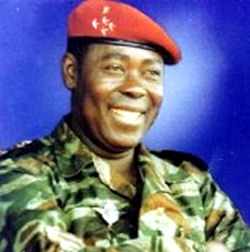1981 - Andre Kolingba
 Following riots in Bangui and the murder of between 50 and 200 schoolchildren, former President Dacko led a successful French-backed coup against Bokassa on September 20, 1979. Dacko's efforts to promote economic and political reforms proved ineffectual, and on September 1, 1981, he in turn was overthrown in a bloodless coup by Gen. Andre Kolingba. A former Ambassador to Canada and Germany, as well as Chief of Staff of the Army, Kolingba become the head of state when then President David Dacko relinquished the presidency in a bloodless coup. For 4 years, Kolingba led the country as head of the Military Committee for National Recovery (CRMN). In 1985 the CRMN was dissolved, and Kolingba named a new cabinet with increased civilian participation, signaling the start of a return to civilian rule. The process of democratization quickened in 1986 with the creation of a new political party, the Rassemblement Democratique Centrafricain (RDC), and the drafting of a new constitution that subsequently was ratified in a national referendum.
Following riots in Bangui and the murder of between 50 and 200 schoolchildren, former President Dacko led a successful French-backed coup against Bokassa on September 20, 1979. Dacko's efforts to promote economic and political reforms proved ineffectual, and on September 1, 1981, he in turn was overthrown in a bloodless coup by Gen. Andre Kolingba. A former Ambassador to Canada and Germany, as well as Chief of Staff of the Army, Kolingba become the head of state when then President David Dacko relinquished the presidency in a bloodless coup. For 4 years, Kolingba led the country as head of the Military Committee for National Recovery (CRMN). In 1985 the CRMN was dissolved, and Kolingba named a new cabinet with increased civilian participation, signaling the start of a return to civilian rule. The process of democratization quickened in 1986 with the creation of a new political party, the Rassemblement Democratique Centrafricain (RDC), and the drafting of a new constitution that subsequently was ratified in a national referendum.
General Kolingba was sworn in as constitutional President on November 29, 1986. The constitution established a National Assembly made up of 52 elected deputies, elected in July 1987. Due to mounting political pressure, in 1991 President Kolingba announced the creation of a national commission to rewrite the constitution to provide for a multi-party system. Multi-party presidential elections were conducted in 1992 but were later cancelled due to serious logistical and other irregularities.
Once Kolingba became president, he initiated an tribally-based recruitment policy for his administration. The M'Baka a small trive located in the Bangui area and also further southwest, variously estimated making up some four to seven percent of the population, supplied the first three CAR presidents. Kolingba was a member of the Yakoma people, who made up approximately 4% to 5% of the population. Under Kolingba, members of Yakoma give all the key positions in the administration, and came to be the majority of the military. Coming to power in a coup d'etat, General Kolingba ruled the CAR as a one party state until forced into elections in 1993. Former U.S. Ambassador to the CAR Daniel Simpson played a large role in Kolingba's eventual fall from power, being a central driver in calling for the country's first democratic presidential elections that brought Ange Felix Patasse into office.
Former Central African President Andre Kolingba, who ruled the country from 1981 to 1993, died in Paris on February 7, 2010 after a long illness. Kolingba's health had deteriorated steadily over the previous two years, though many still thought he would try and run for the presidency in 2010. Kolingba's legacy is underwhelming: he is blamed for the introduction of ethnicity into politics, rarely meeting government pay rolls, and for fomenting coups against Patasse after leaving office. In 2005, the former President, who ran against Bozize, demanded five billion CFA (USD 10 million) from Bozize in exchange for support during runoff elections. The former President was even sentenced to death in absentia in 2001, though he received a pardon by President Bozize in 2003.
|
NEWSLETTER
|
| Join the GlobalSecurity.org mailing list |
|
|
|

